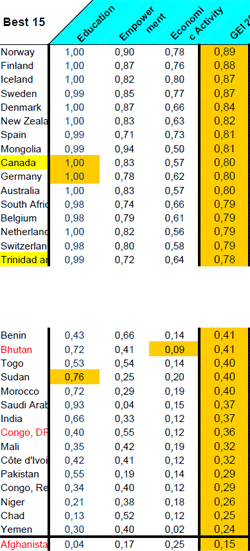Lithuania above the European average in gender equity
|
Published on Mon, 2012-03-19 08:57
In terms of gender equity Lithuania places itself above the European average, and in a better condition than most of its neighbours. However, it is still far from reaching the desired level of equality among Lithuanian men and women. This is made apparent by the publication of the Gender Equity Index (GEI) 2012, published by Social Watch on the eve of Women’s International Day, March 8. The GEI prepared annually by Social Watch measures the gap between women and men in education the economy and political empowerment. The index is an average of the inequalities in the three dimensions. In literacy, it examines the gender gap in enrolment at all levels; economic participation computes the gaps in income and employment; empowerment measures the gaps in highly qualified jobs, parliament and senior executive positions.
Social Watch measures the gap between women and men, not their wellbeing. Thus, a country in which young men and women have equal access to the university receives a value of 100 on this particular indicator. In the same fashion, a country in which boys and girls are equally barred from completing primary education would also be awarded a value of 100. This does not mean that the quality of education in both cases is the same. It just establishes that, in both cases girls are not less educated than boys. Lithuania’s 77 points rank it among those countries with LOW GEI. The country’s index is four points higher than Europe’s average --which is 73--, equals the one of its neighbour Latvia, and is above those of Belarus (64), the Russian Federation (75) and Poland (76). It should be noted that only the eight countries leading the score (Norway, Finland, Iceland, Sweden, Denmark, New Zealand, Spain and Mongolia) reached the minimum of 81 points that places them as countries with a MEDIUM GEI. The five levels according to which the index measures the gender gap are: CRITICAL, VERY LOW, LOW, MEDIUM AND ACCEPTABLE, It should be noted that no country has reached 90 points or more, meaning that no country has yet reached the ACCEPTABLE level. The only dimension in which Lithuania reaches an acceptable value is education (98 points), while in economic participation and empowerment the country’s performance is much less praiseworthy: 83 and 48 respectively (MEDIUM and VERY LOW). Norway, Finland and Iceland are at the top of Europe and also the world, with 89, 88 and 87 points respectively. The three European countries that present largest gender gaps are Malta (63), Albania (55) and Turkey (45). Out of the 154 countries computed by the IEG 2012 those five in the worst global situation are the Republic of Congo (29), Niger (26), Tchad (25), Yemen (24) and Afghanistan (15). Social Watch members are spread across all regions. The network fights for the eradication of poverty and its causes, the elimination of all forms of discrimination and racism and to ensure an equitable distribution of wealth and the realization of human rights. For a detailed description of methodology sources see www.socialwatch.org Tags: |


